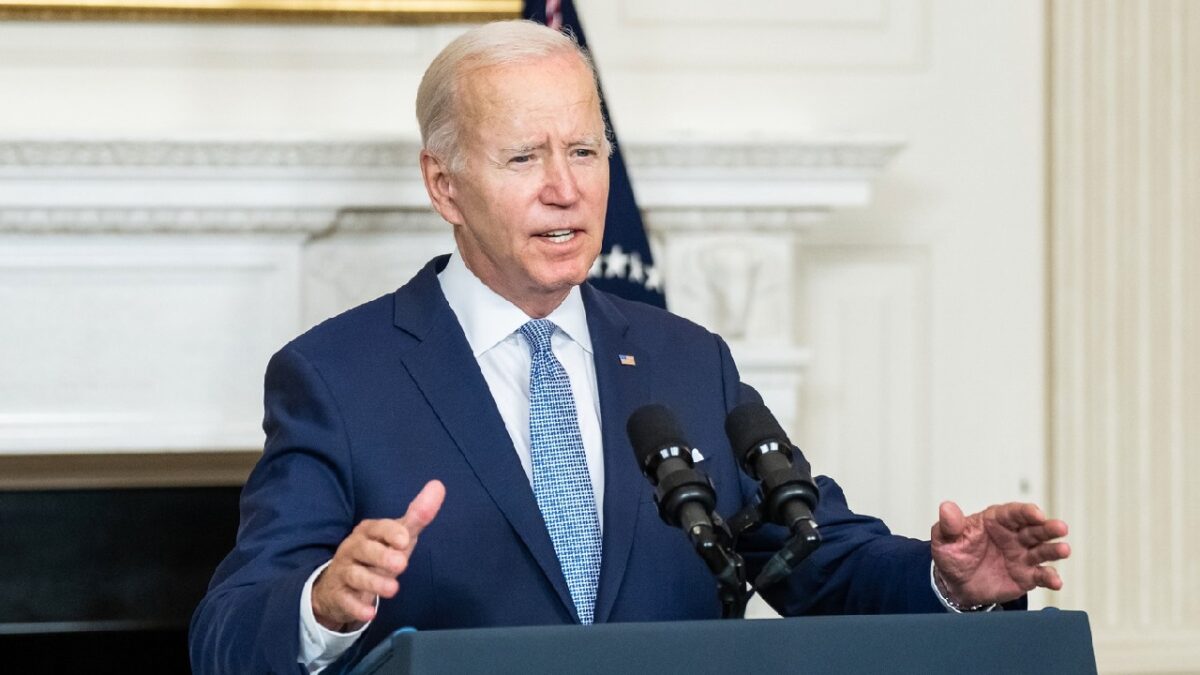President Joe Biden on Thursday warned that Putin was “not joking” when threatening the use of tactical nuclear weapons in Ukraine, and that the world has “not faced the prospect of Armageddon since Kennedy and the Cuban Missile Crisis.” Earlier that same day, Zelensky seemed to justify Biden’s warning when he argued that NATO should conduct “preventive strikes” against Russia instead of waiting to see if Putin would use nuclear weapons. Since his comments went viral, Kyiv claimed to have been discussing economic sanctions and not military action.
(The author of this article, 19FortyFive Contributing Editor Daniel L. Davis, was just on NBC News explaining the situation in Ukraine. See his most recent appearance above.)
It is encouraging that Biden is consciously aware of the extraordinary risks this war poses for the United States, yet troubling that Zelensky appears to be unconcerned. The way each head of state is looking at the Russia-Ukraine War is illustrative of the Gordian Knot facing the world (not just the direct and indirect participants).
As I wrote in these pages last January, the best course of action for the White House would have been to acknowledge the reality that Russia had the capacity to invade Ukraine. The Ukrainian Armed Forces (UAF) were insufficiently strong to prevent it, and thus Biden could have withdrawn the offer of NATO membership to Ukraine and encouraged Kyiv to declare military neutrality.
That would have had a real chance at forestalling the invasion, as doing so would have eliminated Putin’s main fear: having a NATO member on his border in Ukraine. Naturally, those actions wouldn’t have guaranteed against a Russian invasion, but it would have increased the odds considerably that Zelensky’s country could have avoided war.
In such a case, no Ukrainians would have been killed, no Ukrainian cities would have been demolished, and millions of Zelensky’s citizens would never have fled into Europe. Most importantly, however, the world would not now be facing the greatest threat of nuclear weapons’ use since 1962. But that off-ramp was ignored by Ukraine and the West and now we are facing the unthinkable. What matters now, however, is finding a way forward that limits the damage and prevents a catastrophe.
Many in the West have been heartened by the stunning military advances of Zelensky’s troops over the past six or seven weeks. Former general and CIA Director David Petraeus even called Ukraine’s accomplishments “irreversible.” While the excitement is certainly understandable, the war’s trendlines and battlefield math do not support such claims.
The most likely course over the coming three or four months is that the current Ukraine offensive will soon run out of steam and that Putin’s reinforcements will begin to show up in increasing numbers that may well enable Russia to return to the offensive and could result in Putin’s troops retaking some or all of the territories Kyiv has recently captured.
Ukraine has paid for its territorial gains at the cost of significant numbers of its best men and the loss of enormous numbers of armored vehicles. If Russia is soon able to flood the battlefield with hundreds of thousands of new troops, that sheer mass could tip the tactical advantage back in Putin’s favor.
This war has already taken many wild and unexpected turns, and nothing is guaranteed – neither a continued Ukrainian offensive drive to the east nor a Russian counter-counteroffensive to drive the UAF back to the West. What is virtually certain, however, is that the war will continue well into the foreseeable future.
And as long as the war drags on, the risk of nuclear escalation will remain over us all, like a Damocles Sword. Indefinite war is not the only option, however.
In the aftermath of Putin’s illegitimate annexation of Ukrainian territory, Zelensky signed a decree that vowed Ukraine would not negotiate with Putin until all its territories had been returned. While that makes sense for the leader of the country that had its territory forcibly taken, the cold but correct truth is that Ukraine’s security needs are not synonymous with Washington’s security needs. Ukraine is already in a full-on war with Russia and has nothing to lose from escalating the conflict. In fact, Kyiv would be happy to drag the United States into the war as it would relieve pressure on its armed forces.
Regardless of how unpalatable it is to many American pundits, Biden’s first priority is and must remain the protection of American vital national interests and the continued prosperity of the American people. Based on Biden’s comments on Thursday, he seems to understand what’s at stake. Yet as the U.S. continues to increase military support to Ukraine, providing offensive rocket and artillery systems, we continue playing around the edges of the war, maintaining the risk that one day Ukrainian troops succeed so much that Putin faces an existential threat.

U.S. President Joe Biden at the White House. Image Credit: White House Facebook.
If faced with the prospect of losing a war or escalating to nuclear weapons, the chances are high that Putin would cross the nuclear threshold. If that happens, the pressure on Biden will be immense to respond directly against Russian military forces – and that would almost certainly prompt a Russian retaliatory strike directly against the United States, and spark all out war. It is absurd to continue risking such escalations that can, in no way, benefit the United States. Biden must therefore limit his support to Ukraine and prioritize the security of our country.
If he fails to do so, we may all pay a horrible price.
Now a 1945 Contributing Editor, Daniel L. Davis is a Senior Fellow for Defense Priorities and a former Lt. Col. in the U.S. Army who deployed into combat zones four times. He is the author of “The Eleventh Hour in 2020 America.” Follow him @DanielLDavis.

